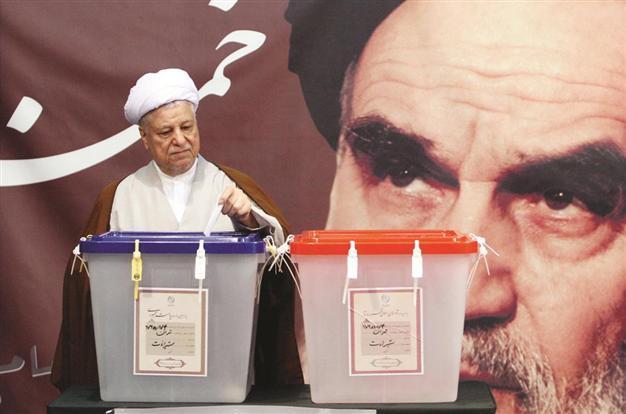Iran votes for president, Khamanei slams doubts
TEHRAN

Former Iranian President Akbar Hashemi Rafsanjani casts his vote in front of a portrait of Islamic revolution’s late founder, Ayatollah
Ruhollah Khomeini in Tehran. AFP photo
Iranians voted for a new president on June 14 urged by Supreme Leader Ayatollah Ali Khamanei to turn out in force to discredit suggestions by arch foe the United States that the election would be unfair.
The ballot, the first presidential poll since 2009 contest which led to months of unrest, is unlikely to bring profound change in Iran’s rocky ties with the West. World powers in talks with Iran over its nuclear program are looking for signs of a recalibration of its negotiating stance after eight years of intransigence under Ahmadinejad.
Voting in the capital Tehran, Khamanei called on Iranians to vote in large numbers and derided Western misgivings about the credibility of the vote. “I recently heard that someone at the U.S. National Security Council said ‘we do not accept this election in Iran’,” he said. “We don’t give a damn.”
On May 24 U.S. Secretary of State John Kerry called into question the credibility of the election, criticizing the disqualification of candidates and accusing Tehran of disrupting Internet access. Iran’s Guardian Council, the state body that vets all candidates, has barred a number of hopefuls from the roster in the ballot, including former president Akbar Hashemi Rafsanjani, who is seen as sympathetic to reform. Iranians can choose from a slate of six candidates, all of whom were approved to run by the Guardian Council.
“What is important is that everyone takes part,” Khamanei said. “Our dear nation should come (to vote) with excitement and liveliness, and know that the destiny of the country is in their hands and the happiness of the country depends on them.”
The vote has taken unexpected turns in the past days as reform-minded Iranians surged behind the lone moderate left on the six-candidate ballot.
Extended votingA victory by former nuclear negotiator Hasan Rowhani would be seen as a small setback for Iran’s Islamic establishment, but not the type of overwhelming challenge posed four years ago by the reformist Green Movement, which was crushed after mass protests claiming Ahmadinejad’s 2009 re-election was the result of systematic fraud in the vote counting.
If no candidate wins an outright majority, a runoff pitting the two top finishers would take place June 21, so even a strong showing by Rowhani in the voting could be overturned. Rowhani’s backers, such as former President Akbar Hashemi Rafsanjani have urged reformists and others to cast ballots and abandon plans to boycott the election in protest over years of arrests and pressure.
State media reported that polling began on schedule at 6 a.m. Iran time. The 10-hour voting period in the presidential election is to be extended because of a “rush of voters,” Interior Minister Mostafa Moammad Najar said. “Because of the rush of voters, voting will be extended for sure,” beyond the scheduled close of 6 p.m., he said. There are more than 50 million Iranians eligible to vote, 1.6 million of them first-time voters.
